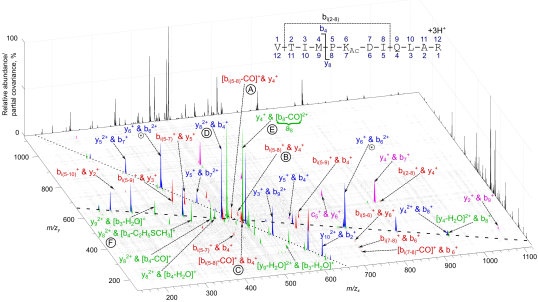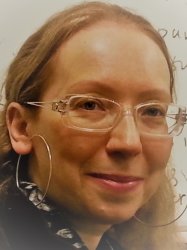Summary
I am a mass spectrometrist, working on the development of new methods for biomolecular structure determination. I have been leading a collaboration between Physics, Chemistry and Surgery & Cancer at Imperial to develop a new kind of two-dimensional mass spectrometry based on the physical principle of partial covariance mapping. The fragment ion correlations revealed by our two-dimensional partial covariance mass spectrometry (2D-PC-MS) provide highly specific information on the biomolecular building block sequence, much more so than the individual fragment mass-to-charge ratios on which the 1D MS is based. As a result, 2D-PC-MS can solve structural problems inaccessible to the standard 1D technique.
Here is an example of 2D-PC-MS spectrum of a triply charged peptide ion:

See more in our recent paper which received coverage in Physics Today. The 2D-PC-MS technology is subject to two patent applications highlighted by the Enterprise Division of Imperial.
Within the Extreme Light Consortium of the Blackett Laboratory, I work on application of ultrashort laser pulses to biomolecular mass spectrometry, as well as on the development of coherent control schemes for the optimal protein sequence coverage.
I obtained my PhD in organic mass spectrometry from Technion - Israel Institute of Technology, after which I moved to the German Cancer Research Centre (DKFZ, Heidelberg) as a Minerva (Max Planck Society) postdoctoral fellow. In DKFZ, I developed negative ion mode collision-induced dissociation for protein post-translational modifications, the field I continued to advance as a German Research Foundation Principal Investigator (DFG Eigene Stelle) in the Max Planck Institute of Molecular Cell Biology and Genetics. After filling a number of university teaching lecturer positions in the UK, I was awarded Wellcome Trust Research Fellowship to create the 2D-PC-MS.
Publications
Journals
Driver T, Averbukh V, Frasiński LJ, et al., 2021, Two-dimensional partial covariance mass spectrometry for the top-down analysis of intact proteins., Analytical Chemistry, Vol:93, ISSN:0003-2700, Pages:10779-10788
Driver T, Bachhawat N, Frasinski L, et al., 2021, Chimera spectrum diagnostics for peptides using two-dimensional partial covariance mass spectrometry, Molecules, Vol:26, ISSN:1420-3049
Driver T, Cooper B, Ayers R, et al., 2020, Two-dimensional partial covariance mass spectrometry of large molecules based on fragment correlations, Physical Review X, Vol:10, ISSN:2160-3308, Pages:041004 – 1-041004 – 13
Katsanovskaja K, Driver T, Pipkorn R, et al., 2019, Negative ion mode collision-induced dissociation for analysis of protein arginine methylation, Journal of the American Society for Mass Spectrometry, Vol:30, ISSN:1044-0305, Pages:1229-1241

